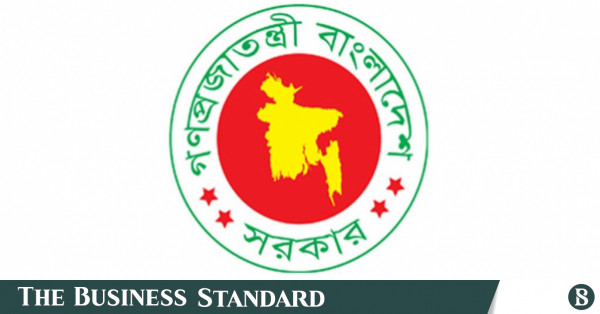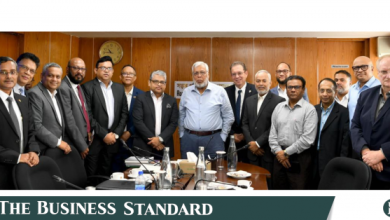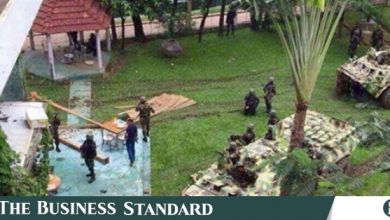Over $100b believed to be laundered, swindled during Hasina regime: CA Office


With the Chief Adviser’s Office’s guesstimate that the amount swindled by corrupt people and businesses would exceed $100 billion, the central bank has come down hard on one such big fish, S Alam Group, found involved in almost emptying a number of banks during the ousted regime.
During Sheikh Hasina’s regime, the group’s owner Saiful Alam gained control of seven banks through special favours from the government. S Alam took out at least Tk2 lakh crore anonymously from various banks, including those under its control, and laundered most of it abroad.
Bangladesh Bank Governor Ahsan H Mansur on Wednesday singled out S Alam as the first person who systematically looted banks.
“I’m not aware of anyone else in the world who has executed a bank robbery in such a well-planned manner,” he said.
Mansur warned against buying properties belonging to or associated with S Alam Group, as depositors of banks badly affected by the business cartel will be refunded through the sale of those assets.
Meanwhile, the Chief Adviser’s Office (CAO) has said works are underway to assess the amount of money laundered abroad or swindled by some corrupt businessmen and influential people in the country.
“Audit works will begin to determine the money swindled by the corrupt people…(but) it can be assumed that the amount could be over $100 billion,” the CAO said in a statement on Wednesday.
It said initiatives were taken by now to bring reforms in the banks and financial institutions involved in such corruption and money laundering while the interim government now reconstituted the governing boards of the Islami Bank, Social Islami Bank, National Bank, United Commercial Bank, Global Islami Bank and Union Bank—six of the seven banks so far controlled by S Alam Group.
“Reforms in other banks and financial institutions will start as well. The actual information of the money laundered will be collected through new managements and audit works will begin to determine the money swindled by the corrupt people,” the statement read.
It said the new management of the banks started works to seize the local swindlers’ assets and bring the laundered money back home with support from the Bangladesh Bank’s Financial Intelligence Unit (BFIU), police’s Criminal Investigation Department (CID) and the Anti-Corruption Commission (ACC).
“The authorities concerned have already sought cooperation from foreign organisations in returning the laundered money to the country,” the statement added.
Following the fall of the Hasina government, the central bank started disbanding the boards of the banks which were under S Alam Group’s grip, while the stock market regulator froze shares of those banks.
“Anyone who buys S Alam’s assets may face legal challenges. We urge everyone not to touch those,” central bank governor Mansur said during a press conference today when asked about the central bank’s course of action regarding the group trying to sell its properties.
He said, “It has to be done through a legal process. We will ask the government to take action. And no one should buy the assets of this group. The money will be returned to depositors by selling these assets.”
Mansur, a former senior IMF official with experience in various countries, said a banking commission will be formed within a month and will include foreign experts, adding, “We will also see how Sri Lanka did it.”
Regarding Islami Bank, he said the bank’s new board has been ordered to submit a work plan within a week.
On Tuesday, Union Bank and Global Islami Bank were removed from S Alam’s control through board restructuring. Previously, Islami Bank, Social Islami Bank, and National Bank were also freed from the business cartel’s grips in a similar manner.
Additionally, S Alam’s cousin, former land minister Saifuzzaman Chowdhury’s family, has been removed from United Commercial Bank. Restrictions have also been imposed on selling S Alam’s shares and withdrawing money from banks, and measures such as requiring a 100% margin for opening letters of credit have been implemented.
When asked about the two former governors, Ahsan H Mansur said, “There was a lack of good governance here. While it’s not to say it won’t happen in the future, it won’t be under my watch. The central bank also needs reform, as it too cannot escape responsibility.”
Addressing depositors, Mansur said, “Please be patient and avoid withdrawing all your money at once. Many made deposits in these banks for higher interest rates, so don’t be impatient now.”
“We want to ensure no deposit money is lost. We will not print money to refund deposits, as it would lead to severe inflation. Withdraw only what is necessary. The situation should improve in six months,” he added.
The governor also said no depositor has lost money in Bangladesh so far. Restoring good governance in banks is crucial for depositor confidence, and initiatives are underway to achieve this.




